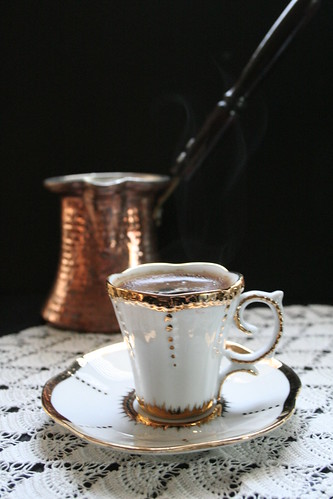
It was the part where he was going for my eyeball with a pointy stick that I started to get worried. “No worries,” he tells me, “just relax,” directing me by the shoulders where to stand, grasping the back of my head and, with the inexpert touch of someone who not only doesn’t do this often but also never does it to himself, he began applying “real Egyptian kohl”. As I understand it, kohl is a very fine kind of charcoal used in ancient times as makeup. As I stood, cramped neck and head tilted awkwardly to the side, he proceeded to blacken my eyesockets and promising me I would come out an “Egyptian queen”. He had started by applying it as eyeliner, and proceeded to use it to black in both of my eyelids. It’s only when the process had already taken twenty minutes with no end in sight did we start making motions to leave and eventually managed to extricate ourselves.
His name was Saïd, and he was the proprietor of the tiny trinket shop in Khan al-Khalili where we were asking for our little Turkish coffee maker, our (until now) unsuccessful mission to make cardamomy coffee goodness at home. His shop was typical of the Khan—rows upon rows upon rows of handmade glass ornaments and goblets, extravagant lamps to be used either with light bulbs or candles which cast the light in intricate patterns, brassworks à la Aladdin’s lamp, fancy teapots, picture frames, inlaid boxes. The usual. Some shops look more like someone’s attic where all the metal is tarnished and random junk sits forgotten in the corner—from strange figurines to old European currency (the first time I’d seen lira, for example). The brassworks shop, the shisha shop, the jewelry shop, and the cloth shops seem to be the most common variants. Saïd had an easy smile, a wheezing laugh, bad teeth, and constantly a cigarette in the hand as he jovially demonstrated how the various glass and brass lamps would look with the aid of a lightbulb on a string. Saïd also had such a coffee maker, and of decent quality (we had, by now, examined half the coffee makers in the entire market, and were aware of the fact that his coffee makers were one-piece and not two-piece, and the handle was solid). He spoke decent English, acceptable French, and bits and pieces of German, and our conversation was a mixture of all four as we admired pictures of his work for hotels and fancy establishments, perched awkwardly on the eclectic collection of stools in the back of the shop, sipped the Arabic coffee he had ordered for us, and chatted about brassworks, glassmaking, his family history, and how it was we came to be in Cairo. We were introduced to the shop cat and “his wife” (the cat’s wife). Unfortunately, petting the kitties in Cairo isn’t a particularly great idea, but oh well; this one didn’t look too scruffy and hopefully didn’t have fleas. Ordering coffee for and sitting with a customer would be unthinkable in many Western countries (at least the bits I’m from), but things obviously work differently here.
I’m not sure if you can call it over-employment or under-employment or unemployment, but it seems most shops are full of approximately six times as many staff members as are necessary. Before we were in Khan al-Khalili we had been to the tailor’s, where my friend was having a suit made and shirts fitted. There’s usually one or two men loitering outside, watching traffic pass and trying to entice customers inside, where another six or eight men were sitting, chatting, and waiting on potential business. The salesman helping you invariably consults with two or three others in most decisions, such that you are subjected to a flurry of activity wherever you go. Many people for little work. Having home improvements done—for example, having water damage remedied—requires a series of different workmen, one to look at the problem, one to remove the wallpaper, one examine the damage, one to sand down the wall beneath, another to apply new wallpaper, and another to clean up. Busy streets turn into mini open-air cafés, as anyone seated nearby will be offered tea by some entrepreneurial individual who comes back later for his dishes. On many street corners you’ll find a guy with an oven on wheels, roasting sweet potatoes or corn, yours for a pound or two. Any doorway becomes almost an ‘official’ café, with shisha pipes, a more reputable-looking refreshment system, and invariably a collection of men playing dominos or backgammon. There’s usually a lot of people not doing a lot of anything, or maybe there’s nothing to do, or maybe they just have it figured out better than those of us constantly pretending to be busy doing something.



No comments:
Post a Comment